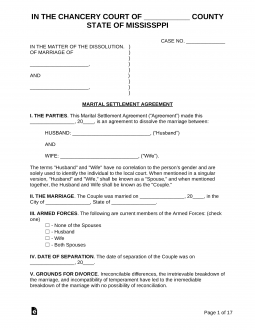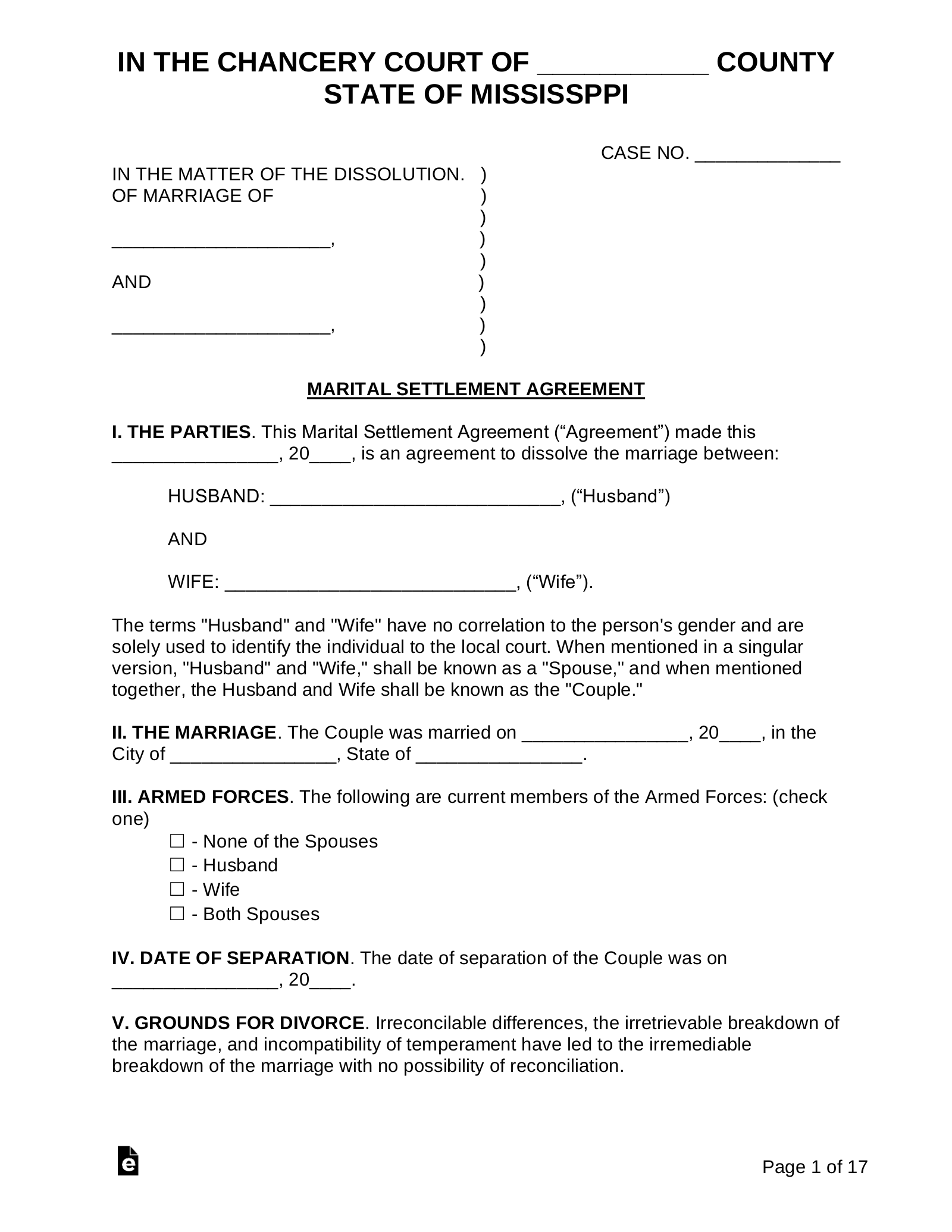Updated September 01, 2023
A Mississippi marital settlement agreement is a legal contract whereby a married couple agrees to the terms of their divorce, including the division of marital property, alimony, child custody, alimony, and child support. If a couple seeks a “no-fault” divorce on the grounds of irreconcilable differences, they are required to reach an agreement before a final judgment can be made. Due to the complex and legally binding nature of marital settlement agreements, it is recommended that couples consult with legal professionals before executing a contract.
Table of Contents |
Divorce Laws
Statutes – Mississippi Code – Title 93, Chapter 5 (Divorce & Alimony) and Chapter 27 (Uniform Child Custody Jurisdiction and Enforcement Act)
Alimony (§ 93-5-23) – Either spouse can request that the court grant them financial support from the other party, paid in one (1) lump sum or on a periodic basis after the divorce is final.
- Alimony Calculator – calculators.law
Child Support (§ 93-5-23) – The court may award child support to one (1) spouse in an amount determined by the non-custodial spouse’s income.
- Child Support Calculator – diydivorcereview.com
Division of Property (§ 93-5-23) – As an equitable distribution state, Mississippi courts do not divide marital property equally. Instead, if the division of property is left to the court, they will divide it in a manner that they deem to be “equitable and just.”
Grounds for Divorce (§ 93-5-1 and § 93-5-2) – Spouses can file for divorce on the “no-fault” grounds of irreconcilable differences or on one (1) or more of the “fault-based” grounds listed below.
- Impotence
- Adultery
- Spouse was sentenced to a penitentiary
- Desertion of one (1) year
- Habitual intoxication
- Cruel and inhuman treatment
- Mental illness/intellectual disability
- Spouse was already married at the time of their marriage
- Pregnancy by another person without the spouse’s knowledge
- The marriage is prohibited by law due to the couple’s relation to each other
- Insanity
Interim Support (§ 93-5-23) – Upon the filing of a petition, the court may award a spouse temporary alimony to be paid by the non-filing party while the case is pending.
Residency (§ 93-5-5) – At least one (1) of the spouses must have been a Mississippi resident for six (6) months, at minimum, before their case is filed.
Divorce Forms
- Where to File – Chancery Court in County of Residence
- Filing Fee – At least $50
- How Long Does it Take? At least sixty (60) days
Uncontested Divorce with No Children:
- Joint Complaint for Divorce (EXAMPLE – Rankin County)
- Civil Coversheet (EXAMPLE – Desoto County)
- Marital Settlement Agreement
- Financial Disclosure Statement
- Request for Hearing
- Notice of Hearing
- Judgment of Divorce
Uncontested Divorce With Children:
- Joint Complaint for Divorce (EXAMPLE – Rankin County)
- Civil Coversheet (EXAMPLE – Desoto County)
- Marital Settlement Agreement
- Financial Disclosure Statement
- Affidavit Regarding the Children
- Child Support Computation Worksheet
- Request for Hearing
- Notice of Hearing
- Judgment of Divorce
How to File for Divorce in Mississippi (6 steps)
- Complete Divorce Paperwork
- Additional Forms Required for Couples with Children
- File Divorce Paperwork with Chancery Court
- Request for Hearing
- Judgment of Divorce
- Name Change
1. Complete Divorce Paperwork
For a couple to divorce in Mississippi, the law requires that at least one (1) spouse has been a state resident for six (6) months or more prior to opening their case. If the couple is in agreement regarding the terms of their divorce, they can file for an uncontested divorce which permits them to avoid unnecessary legal costs and litigation. An uncontested divorce, more commonly termed in Mississippi as an “irreconcilable differences divorce,” requires the two (2) parties to file a joint petition and reach a formal agreement. A full list of the required forms is provided below (these forms can be obtained from the Chancery Court where the case will be filed).
- Joint Complaint for Divorce (EXAMPLE – Rankin County)
- Civil Coversheet (EXAMPLE – Desoto County)
- Marital Settlement Agreement
- Financial Disclosure Statement
- Judgment of Divorce
The Joint Complaint for Divorce and Marital Settlement Agreement forms must be signed by both parties in front of a notary public. The Financial Disclosure Statements must be completed and filed by each spouse individually.
Drafting the Marital Settlement Agreement often necessitates the mediation of legal professionals and must be completed prior to filing a joint complaint. If the couple has few assets and property, legal mediation may not be necessary.
Couples without children can access the Automated Divorce Packet to fill out the necessary forms (with the exception of the Marital Settlement Agreement).
2. Additional Forms Required for Couples with Children

If the couple has children, they will also be required to complete an Affidavit Under Uniform Child Custody Jurisdiction And Enforcement Act (UCCJEA) which states the residence and custody of the children. If either spouse is seeking child support, a Child Support Computation Worksheet must be filled out by the non-custodial parent.
3. File Divorce Paperwork with Chancery Court

The completed divorce forms will need to be filed in the chancery court for the county wherein the couple was married or either spouse currently resides. The clerk of the court will require a filing fee that must be paid by check, cash, or money order. The associated fees vary from county to county; therefore, the clerk’s office should be contacted in advance to verify the correct amount.
4. Request for Hearing
Once a case has been filed, either spouse can file a Request for Hearing with the court clerk to ensure that their final hearing is scheduled as soon as possible. The hearing date will be at least sixty (60) days after the Complaint was filed and each party will receive a Notice of Hearing that will inform them of the time and date for their court appearance.
5. Judgment of Divorce
At the final hearing, the judge will review the couple’s Complaint for Divorce and Marital Settlement Agreement, and may question each spouse regarding their irreconcilable differences and the terms of their agreement. If everything is in order, the judge will sign the Judgment of Divorce at which point the divorce becomes final. Once the judgment has been received by the chancery clerk’s office, the couple may obtain certified copies to update their records.
6. Name Change

Either spouse may request that a legal name change be included in their Divorce Judgment. Once the divorce and name change have been granted, the individual may update their identification and accounts by presenting a certified copy of the judgment. After a divorce has taken place, individuals must open a new case to change their name by filing a Petition for Name Change of Adult with the chancery court in their county of residence.


